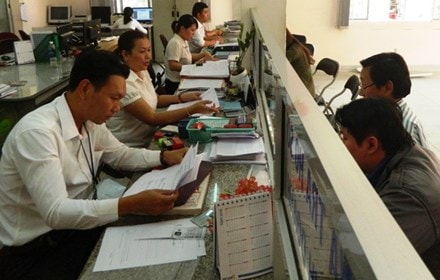'Ward official with 2 children, income of 4.5 million' is definitely a poor household
Mr. Hoang Van Tai, Chairman of Ward 13 People's Committee (Tan Binh District) said that with an average income of 4.5 million VND/month (part-time 3 million VND/month), any cadre who has 2 children is definitely a poor household.
 |
| Officers of Ward 7 People's Committee, Phu Nhuan District are handling administrative procedures for people. |
On March 27, the National Assembly delegation led by Vice Chairman of the National Assembly Uong Chung Luu supervised the implementation of legal policies on reforming the state administrative apparatus in the 2011-2016 period in Ho Chi Minh City.
Mr. Chau Van La, Chairman of Tan Binh District People's Committee, said that the temporary suspension of recruitment of accounting and medical staff for preschool level pending approval of the project has caused many difficulties for the locality because many accountants have reached retirement age, the locality is not allowed to recruit new people so it has to use people without expertise to replace them.
According to Deputy Director of the Department of Home Affairs Le Van Lam, using unqualified people as accountants is very dangerous because many schools' revenue is from 5-7 billion VND/month.
Mr. Hoang Van Tai, Chairman of Ward 13 People's Committee (Tan Binh District) said that although they are both cadres and civil servants in the ward People's Committee, civil servants (staff members) receive salaries according to coefficients while non-professional civil servants only receive minimum wages and do not receive sick leave, maternity leave, unemployment benefits, etc.
“With an average income of 4.5 million VND/month (part-time 3 million VND/month), any officer who has 2 children is definitely a poor household,” said Mr. Tai.
Explaining the supervisory delegation's question about why Ho Chi Minh City lacks innovative models and organizational structures, Director of the Department of Home Affairs Truong Van Lam said that Ho Chi Minh City has asked for approval and received permission from the Politburo to develop a project for urban government. Ho Chi Minh City finished developing the project when the National Assembly "decided" on the 2013 Constitution. Ho Chi Minh City submitted the project after completing the consultation with the Ministries and Branches, but the Central Government requested that it not be implemented anymore.
“HCMC stumbled because of changes at the central level. For example, in land management. Previously, there were land use registration offices in 24 districts, but later the central level requested a merger, leaving only one office under the Department of Natural Resources and Environment. Merging is great but does not meet the requirements, leading to the compensation boards of districts being concentrated at the Department. Without being linked to the local government, compensation and clearance will be stuck. That is why there are many suspended plans and slow project implementation,” Mr. Lam said.
Admitting that HCMC has more than 3,000 surplus employees compared to the project approved by the Government in 2015, Mr. Lam said that HCMC is a special urban area. The 13 million population of HCMC is very different from other provinces and cities because it includes tens of thousands of businesses, so the working scale must be appropriate.
“If we reduce the number of staff to 8,500, it will not be able to meet the requirements. Urban management work is very heavy. Ho Chi Minh City cannot reduce the number of staff in education and health. Recently, departments and branches submitted plans. Every unit asked to increase the number of staff,” Mr. Lam said./.
According to TPO
| RELATED NEWS |
|---|
